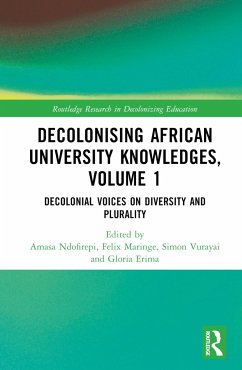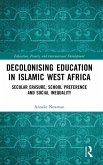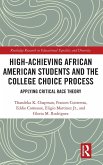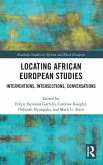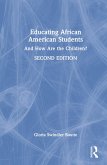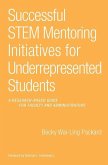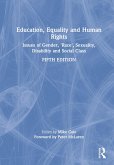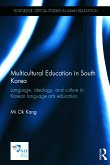Decolonising African University Knowledges, Volume 1
Voices on Diversity and Plurality
Herausgeber: Ndofirepi, Amasa P.; Vurayai, Simon; Maringe, Felix
Decolonising African University Knowledges, Volume 1
Voices on Diversity and Plurality
Herausgeber: Ndofirepi, Amasa P.; Vurayai, Simon; Maringe, Felix
- Gebundenes Buch
- Merkliste
- Auf die Merkliste
- Bewerten Bewerten
- Teilen
- Produkt teilen
- Produkterinnerung
- Produkterinnerung
This timely work investigates the possibility of unyoking and decolonising African university knowledges from colonial relics. It claims that academics from socially, politically, and geographically underprivileged communities in the South need to have their voices heard outside of the global power structure.
Andere Kunden interessierten sich auch für
![Decolonising Education in Islamic West Africa Decolonising Education in Islamic West Africa]() Anneke NewmanDecolonising Education in Islamic West Africa170,99 €
Anneke NewmanDecolonising Education in Islamic West Africa170,99 €![High Achieving African American Students and the College Choice Process High Achieving African American Students and the College Choice Process]() Thandeka K. ChapmanHigh Achieving African American Students and the College Choice Process177,99 €
Thandeka K. ChapmanHigh Achieving African American Students and the College Choice Process177,99 €![Locating African European Studies Locating African European Studies]() Locating African European Studies177,99 €
Locating African European Studies177,99 €![Educating African American Students Educating African American Students]() Gloria Swindler BoutteEducating African American Students168,99 €
Gloria Swindler BoutteEducating African American Students168,99 €![Successful STEM Mentoring Initiatives for Underrepresented Students Successful STEM Mentoring Initiatives for Underrepresented Students]() Becky Wai-Ling PackardSuccessful STEM Mentoring Initiatives for Underrepresented Students171,99 €
Becky Wai-Ling PackardSuccessful STEM Mentoring Initiatives for Underrepresented Students171,99 €![Education, Equality and Human Rights Education, Equality and Human Rights]() Education, Equality and Human Rights168,99 €
Education, Equality and Human Rights168,99 €![Multicultural Education in South Korea Multicultural Education in South Korea]() Mi Ok KangMulticultural Education in South Korea196,99 €
Mi Ok KangMulticultural Education in South Korea196,99 €-
-
-
This timely work investigates the possibility of unyoking and decolonising African university knowledges from colonial relics. It claims that academics from socially, politically, and geographically underprivileged communities in the South need to have their voices heard outside of the global power structure.
Produktdetails
- Produktdetails
- Verlag: Routledge
- Seitenzahl: 154
- Erscheinungstermin: 14. Oktober 2022
- Englisch
- Abmessung: 240mm x 161mm x 13mm
- Gewicht: 402g
- ISBN-13: 9781032132273
- ISBN-10: 1032132272
- Artikelnr.: 64361182
- Herstellerkennzeichnung
- Libri GmbH
- Europaallee 1
- 36244 Bad Hersfeld
- gpsr@libri.de
- Verlag: Routledge
- Seitenzahl: 154
- Erscheinungstermin: 14. Oktober 2022
- Englisch
- Abmessung: 240mm x 161mm x 13mm
- Gewicht: 402g
- ISBN-13: 9781032132273
- ISBN-10: 1032132272
- Artikelnr.: 64361182
- Herstellerkennzeichnung
- Libri GmbH
- Europaallee 1
- 36244 Bad Hersfeld
- gpsr@libri.de
Amasa P. Ndofirepi holds a PhD in Philosophy of Education and is currently an Associate Professor of Philosophy and History of Education. He has extensive experience in teacher education, previously worked at various higher education institutions in Zimbabwe and South Africa and has research interests in higher education studies from a philosophical perspective. Felix Maringe is a Professor of Higher Education and Head of the School of Education at the University of the Witwatersrand in South Africa. He researches issues of social justice in the Internationalisation and Globalisation of Higher Education. Felix is widely published in refereed journals and has six books to his credit. Simon Vurayai is a post-doctoral research fellow at the University of Johannesburg in South Africa. He holds a PhD in Sociology of Education. He is also a lecturer in the Sociology of Education at Great Zimbabwe University. His research interests are gender studies, social justice, problems in education, sociology of knowledge, sociology of mass media, sociology of development and poverty Gloria Erima is a post-doctoral fellow at the department of Education and Curriculum Studies at the University of Johannesburg in South Africa. Her research interest is centred around issues of social justice in education. She obtained her PhD in Education Leadership and Management at the University of the Witwatersrand in South Africa.
1.Gender, disability and rurality: decoding the themes in the African
university milieu. 2.Reflection on disability (and) educational justice in
Africa's structurally unjust society during the COVID-19 pandemic lockdown.
3.Improving processes, practices and structures in South African higher
education: Voices of students with disabilities. 4.Social justice in higher
education: a quest for equity, inclusion and epistemic access.
5.Decolonizing African university teaching by unyoking Deaf culture from
disability. 6.Theorising feminist voices in the curriculum in an African
university. 7.Knowledge democracy and feminist epistemic struggle in
African universities. 8.Globalisation and commodification of knowledge
liberating women's academic achievements from conventional global power
hierarchies. 9.The place of universities in Africa in the global
information society: A critique. 10.Gender, disability, rurality, and
social injustice in the African university: Opportunities going forward.
Afterword
university milieu. 2.Reflection on disability (and) educational justice in
Africa's structurally unjust society during the COVID-19 pandemic lockdown.
3.Improving processes, practices and structures in South African higher
education: Voices of students with disabilities. 4.Social justice in higher
education: a quest for equity, inclusion and epistemic access.
5.Decolonizing African university teaching by unyoking Deaf culture from
disability. 6.Theorising feminist voices in the curriculum in an African
university. 7.Knowledge democracy and feminist epistemic struggle in
African universities. 8.Globalisation and commodification of knowledge
liberating women's academic achievements from conventional global power
hierarchies. 9.The place of universities in Africa in the global
information society: A critique. 10.Gender, disability, rurality, and
social injustice in the African university: Opportunities going forward.
Afterword
1.Gender, disability and rurality: decoding the themes in the African
university milieu. 2.Reflection on disability (and) educational justice in
Africa's structurally unjust society during the COVID-19 pandemic lockdown.
3.Improving processes, practices and structures in South African higher
education: Voices of students with disabilities. 4.Social justice in higher
education: a quest for equity, inclusion and epistemic access.
5.Decolonizing African university teaching by unyoking Deaf culture from
disability. 6.Theorising feminist voices in the curriculum in an African
university. 7.Knowledge democracy and feminist epistemic struggle in
African universities. 8.Globalisation and commodification of knowledge
liberating women's academic achievements from conventional global power
hierarchies. 9.The place of universities in Africa in the global
information society: A critique. 10.Gender, disability, rurality, and
social injustice in the African university: Opportunities going forward.
Afterword
university milieu. 2.Reflection on disability (and) educational justice in
Africa's structurally unjust society during the COVID-19 pandemic lockdown.
3.Improving processes, practices and structures in South African higher
education: Voices of students with disabilities. 4.Social justice in higher
education: a quest for equity, inclusion and epistemic access.
5.Decolonizing African university teaching by unyoking Deaf culture from
disability. 6.Theorising feminist voices in the curriculum in an African
university. 7.Knowledge democracy and feminist epistemic struggle in
African universities. 8.Globalisation and commodification of knowledge
liberating women's academic achievements from conventional global power
hierarchies. 9.The place of universities in Africa in the global
information society: A critique. 10.Gender, disability, rurality, and
social injustice in the African university: Opportunities going forward.
Afterword

